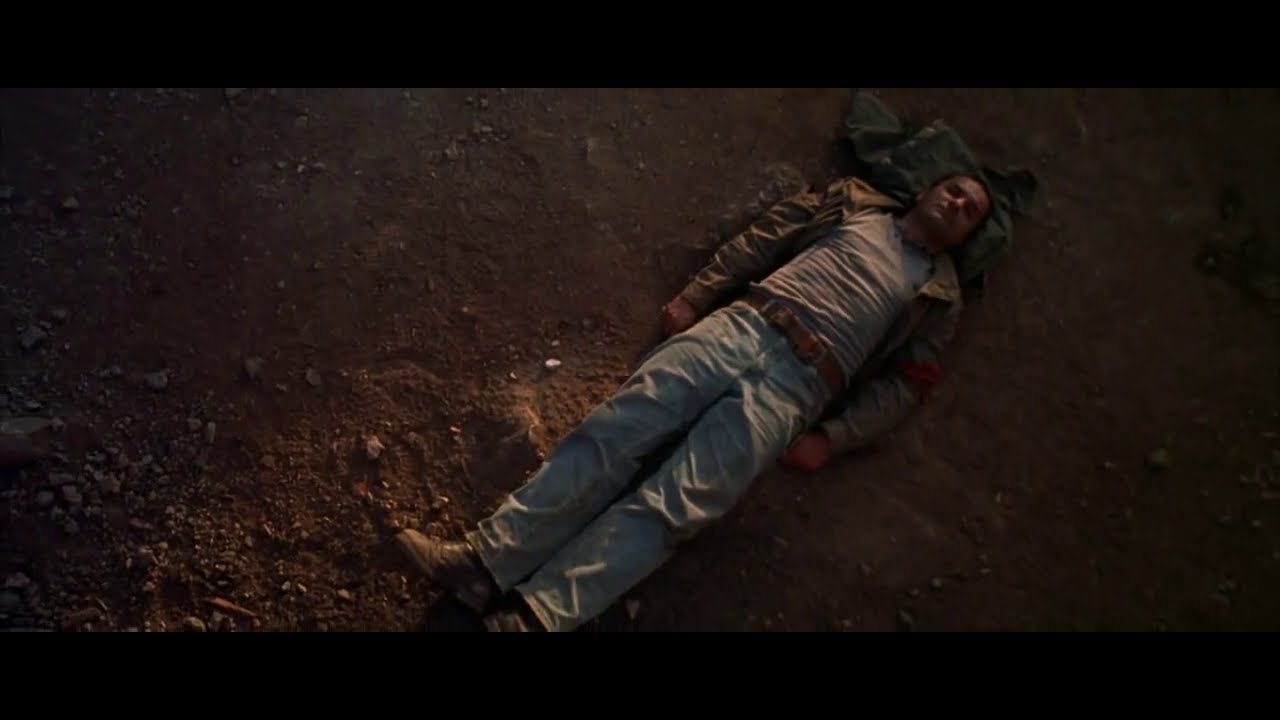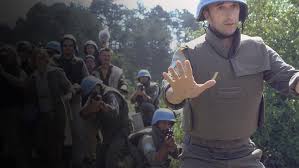🎬 No Man’s Land (2001)

No Man’s Land (2001): A Powerful Exploration of War’s Absurdity and Humanity
No Man’s Land (2001), directed by Danis Tanović, is a war drama set against the backdrop of the Bosnian War. The film presents an intimate and tragic portrayal of the absurdity of conflict, highlighting the futility of war and the shared humanity of those caught in its devastating grip. With its sharp dialogue, dark humor, and poignant storytelling, No Man’s Land captures the absurdity of war while offering a deep, humanizing perspective on the experience of soldiers on both sides.
Plot Overview: A Tale of War, Misunderstanding, and Survival
The film centers around two soldiers, one Bosnian and one Serbian, who find themselves trapped in a trench between the opposing forces during the Bosnian War. The two men—Ciki, a Bosnian soldier, and Nino, a Serbian soldier—are stuck in “no man’s land,” a desolate area between enemy lines, unable to escape. Their situation becomes even more complicated when a wounded third soldier, a young Bosnian named Nino, is caught in the same predicament.
As the two soldiers struggle to survive in a war-torn landscape, the tension between them builds. Despite the animosity between their respective countries, they are forced to communicate, share their limited resources, and even collaborate in order to stay alive. The film explores the absurdity of war through their interactions, as they realize that, in the face of death and violence, their differences seem almost meaningless.
The situation grows more dire when the soldiers’ plight is discovered by the media, and journalists from both sides descend upon the scene. The soldiers’ lives become bargaining chips for political gain, further highlighting the dehumanizing effects of war and the complex dynamics of international conflict.
Themes: The Absurdity of War, Humanity, and the Costs of Conflict
At the heart of No Man’s Land lies its exploration of the absurdity of war. The film critiques the senseless violence that arises from conflict, showing how soldiers, who are often reduced to mere pawns in larger political games, are caught in a cycle of hatred, misunderstanding, and violence. Through its portrayal of Ciki and Nino, the film emphasizes that soldiers, regardless of nationality, are human beings who share common fears, dreams, and desires.
The film also delves deeply into the theme of dehumanization, showing how war turns people into symbols of their countries rather than individuals. Both the Bosnian and Serbian soldiers are reduced to stereotypes in the eyes of their respective sides, with their true humanity obscured by the larger forces at play. No Man’s Land brings this reality into sharp focus by showing how the soldiers’ personal struggles are often overshadowed by the political and military forces that surround them.
Another prominent theme is the futility of war and the devastating consequences it has on both individuals and societies. The soldiers’ suffering is ultimately meaningless, as the film underscores the idea that war does not resolve the issues it is meant to address but only deepens divisions and creates more suffering. The film’s tragic conclusion reinforces this message, leaving viewers with a profound sense of the senselessness of violence and conflict.
The Cast and Performances: Bringing Humanity to the Frontlines
- Branko Đurić as Ciki: Branko Đurić delivers a powerful performance as Ciki, the Bosnian soldier. His portrayal of a man caught between duty and humanity is poignant and empathetic, making Ciki a character that viewers can connect with on a deep emotional level. Đurić skillfully navigates Ciki’s complex emotions, from his frustration and anger to his vulnerability and fear, creating a character whose internal struggle mirrors the external conflict around him.
- Rene Bitorajac as Nino: Rene Bitorajac plays Nino, the Serbian soldier who shares a similar predicament to Ciki. Bitorajac’s performance is equally strong, as he captures Nino’s initial resistance to cooperating with the enemy soldier and his eventual realization of the shared humanity between them. Nino’s journey from soldier to human being is central to the film’s emotional arc, and Bitorajac brings this transformation to life with subtlety and nuance.
- Filip Šovagović as the UN Peacekeeper: Filip Šovagović portrays a peacekeeper who, despite his best efforts, is unable to break the deadlock between the two soldiers and their respective sides. His performance highlights the bureaucratic and impotent nature of international intervention in times of conflict, adding a layer of critique to the film’s portrayal of political and military institutions.
- Katarina Čas as the Reporter: Katarina Čas plays the reporter who covers the soldiers’ situation, serving as a symbol of the media’s role in amplifying the human cost of war. Her character is a reminder of the distance between the people in power and the soldiers who are directly affected by conflict.
Cinematography: A Gripping and Minimalist Approach
The cinematography in No Man’s Land is striking in its simplicity and effectiveness. The film takes a minimalist approach, focusing on the confined space of the trench and the barren landscape around it. The camera work is intimate, often framing the characters in close-up to emphasize their emotional states and the tension between them. The limited set design—primarily the trench and the surrounding war-torn terrain—adds to the feeling of isolation and hopelessness, reflecting the internal struggles of the soldiers as they come to terms with their situation.
The use of natural lighting enhances the realism of the film, casting a gritty, muted tone over the events unfolding. The cinematography’s stark realism serves to heighten the emotional weight of the story, reminding the audience that the conflict is not an abstract concept but a lived reality for those involved.
Critical Reception: Acclaimed for Its Realism and Humanity
No Man’s Land received widespread critical acclaim for its portrayal of the Bosnian War, with particular praise for its nuanced approach to the human side of the conflict. Critics highlighted the film’s ability to blend dark humor with deeply emotional moments, creating a narrative that is both tragic and thought-provoking.
The film won several awards, including the Oscar for Best Foreign Language Film, cementing its place as a significant contribution to the genre of war cinema. Its success also sparked conversations about the power of film to convey the emotional and personal toll of war, highlighting the need for more humanizing depictions of conflict.
- Rotten Tomatoes: The film holds a high approval rating on Rotten Tomatoes, with critics praising its unique blend of satire and tragedy. (rottentomatoes.com)
- The Guardian: The Guardian described the film as “a powerful statement about the futility of war, told with biting humor and devastating realism.” (theguardian.com)
Legacy and Impact: A Film That Resonates Beyond the Bosnian War
While No Man’s Land is specifically set during the Bosnian War, its themes of human suffering, the absurdity of conflict, and the need for empathy resonate universally. The film’s poignant exploration of the emotional and psychological toll of war transcends its specific historical context, making it relevant to any viewer who has experienced the impact of violence and war on a personal level.
The film’s success and critical acclaim helped bring international attention to the human costs of the Bosnian War, a conflict that was often underreported in mainstream media. Through its powerful performances and thoughtful narrative, No Man’s Land serves as a reminder of the shared humanity that binds people together, even in the most divisive and violent of circumstances.
Final Thoughts: A Must-See Film on the Futility and Tragedy of War
No Man’s Land (2001) is an emotionally powerful and thought-provoking film that highlights the absurdity of war and the shared humanity of those caught in its horrors. With its strong performances, gripping cinematography, and poignant storytelling, the film is both a searing critique of conflict and a deep exploration of the emotional and psychological toll that war inflicts on soldiers. Whether you are a fan of war films or simply interested in thought-provoking cinema, No Man’s Land is a must-see movie that leaves a lasting impression on its viewers.










